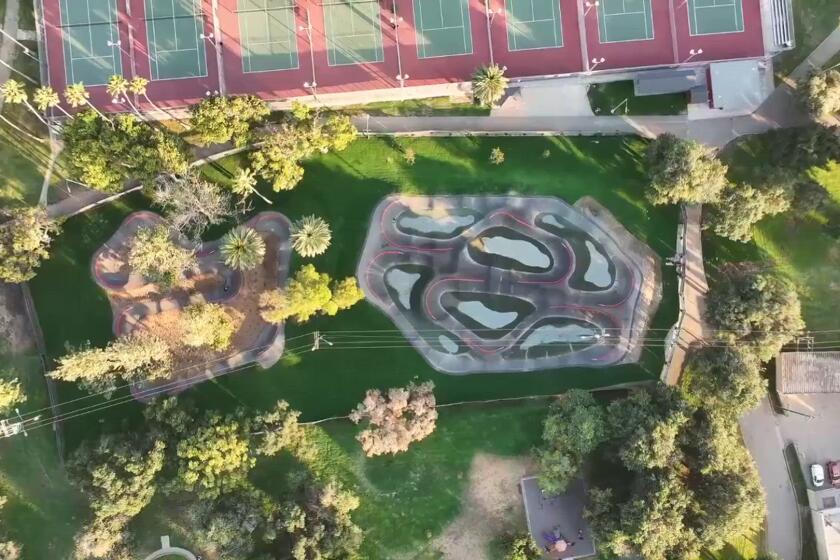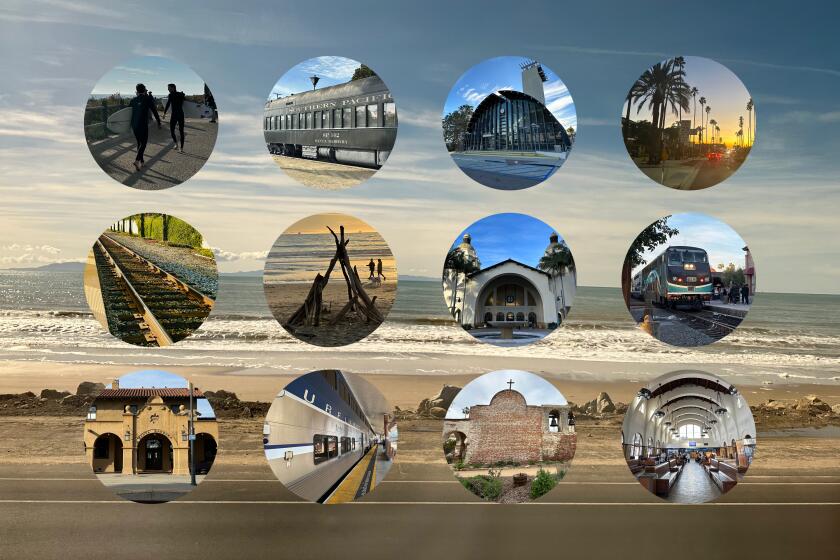TRAVELING IN STYLE : BACK TO THE RIVER OF NO RETURN : Few wilderness areas offer the harmony that surrounds Idaho’s Shepp Ranch, a refuge of unsullied solitude
The seduction began the moment the bush pilot maneuvered the little single-engine airplane out of the heavens and into the canyon through which flows the Salmon, Idaho’s storied River of No Return. Settling onto an unpaved runway, the plane bounced over potholes while a herd of elk stared motionless from a towering peak and a lone eagle rode a thermal above pinnacles that pierced an incredibly blue sky. As the pilot switched off the engine, the voice of a blue jay called out from the forest and the wind wafted through a stand of ponderosa pine.
Few wilderness areas on earth offer the harmony that surrounds Shepp Ranch, a hideaway in central Idaho that’s unrivaled--anywhere in the West--for tranquillity. It is here that runaways from America’s crowded cities arrive to recharge their souls in a setting that features Rocky Mountain peaks, Alpine meadows and the soothing song of the Salmon as it wends its way through the second-deepest gorge in North America--a gorge deeper even than the Grand Canyon.
For the record:
12:00 a.m. Oct. 28, 1990 For the Record
Los Angeles Times Sunday October 28, 1990 Home Edition Travel Part L Page 2 Column 2 Travel Desk 1 inches; 30 words Type of Material: Correction
Shepp Ranch--In the information box accompanying “Back to the River of No Return” (Traveling in Style, Oct. 21), Shepp Ranch was listed as having an elevation of 22,000 feet. The elevation is actually 2,200 feet.
Guests at Shepp Ranch learn the true meaning of solitude, which is why no one is eager to leave. Not after a few days, not even a couple of weeks. This isn’t to say that Shepp is one of those country-club ranches. Indeed, it is without television, telephones or newspapers. It is for this very reason that vacationers wishing to escape the pressure cooker choose Shepp with its scattering of rustic cabins and engaging lodge where a friendly mutt named Cotter snoozes while logs snap in the fireplace and guests read or play cards. A bearskin covers one wall, and a bookcase contains a collection of National Geographic magazines dating to 1916.
At Shepp Ranch no one locks a door, simply because it is unnecessary. Without a road for miles, no one gives a hoot about security. Shepp is an experience that haunts the psyche--long after one returns to the restless world of cities and freeways and polluted skies. The ranch is accessible only by the river, or by the Cessna that flies north 150 miles from Boise. The nearest settlement, Riggins (with its 500 satisfied souls), is 43 miles downriver. Beyond Riggins the road comes to an abrupt end--15 miles from the ranch. It is there, at Road’s End, that guests are picked up by a jet boat that delivers them through rapids and dark green waters.
Shepp faces the River of No Return at its confluence with Crooked Creek, so there is a rush of water that lulls guests to sleep with its constant song. A haunting, roadless country, the area that surrounds Shepp Ranch represents one of the last expanses of untouched wilderness in America. Moss-covered logs lie in the damp forest; black bears roam the rocky shore; horses graze in the pasture and leaves turn with the coming of autumn.
I have been here three days and the dream is nearly over. Soon the Cessna will be returning and the experience of having known Shepp will be but a memory that began with the flight from Boise.
Leaving that city, we flew above heavily forested mountains and 9,500-foot-high peaks over which the little airplane was rocked by thermals. Below, dusty logging roads led to forests; dozens of lakes and streams mirrored a morning sky the shade of faded denims. Beneath the wing I caught a glimpse of a valley as green as Ireland itself. Herds of cattle grazed in peaceful pastures and farms appeared on the horizon; and after that there was only wilderness--mile after mile of wilderness.
If one is apprehensive about small airplanes and tight approaches--particularly onto an unpaved runway--my suggestion is to drive from Boise and catch the boat at Road’s End. For the aerial approach to Shepp Ranch isn’t an experience for the faint of heart--nor one that’s easily forgotten. Nearing the ranch, pilot Rod Nielsen put the plane into a tight turn and expertly sideslipped into the canyon. Rocky walls spun past like a descending curtain while the plane dropped toward the river on its final approach. Nielsen banked and we came in at near treetop level, touching down to face a scene that would have inspired Jack London.
Rising beside a chestnut tree, the lodge at Shepp Ranch is within earshot of the Salmon. Guest cabins face the river and others are hidden in the forest, where wildlife abounds. Indeed, a couple of years ago a bear was caught crawling out a kitchen window, a sack of flour clamped firmly in its jaws. And only a few nights ago, while a guest stood studying the stars, a black bear ambled out of the trees, peered curiously, then disappeared into the darkness.
Deer graze in the yard, and herds of elk slip out of the forest to raid berry bushes. If one is bored by wilderness, cross Shepp Ranch off the list. In this unsullied setting, there’s not a single disco or boogie bar within miles. Instead, guests ride to abandoned mines and trout streams and go rafting and fishing on the Salmon, wade into Crooked Creek or laze in the sun on a sand bar. At night they read beside wood-burning stoves until the witching hour--which is 11 o’clock--when the generator supplying electricity is switched off till dawn.
With accommodations for only 20 guests, Shepp Ranch caters to the vacationer seeking solitude in a setting as peaceful as a fresh dawn. Meals served family style are prepared by Gini von Essen, an expatriate of the city who turns out barbecued ribs, grilled salmon steaks, trout omelets, home-baked breads, pies and cakes, as well as down-home favorites: fried chicken, mashed potatoes, corn on the cob, hot biscuits, blueberry and sourdough pancakes and rhubarb muffins.
A physician from Boise was bowled over a couple of years ago when von Essen served Yorkshire pudding to a group of hunters. “I couldn’t believe it,” he said--”here in the wilds of Idaho.”
Only the other night, von Essen paraded into the dining room with a platter of baked Alaska. Nearly everything she serves is grown on the ranch or taken from the river: cherries and apples for the pies, vegetables, salmon and trout. Each year, she cans up to 1,000 quarts of apple butter, berries, plums, squash and rhubarb.
A couple of years ago, when 17-year-old Steve Ruzich summered with his parents at Shepp Ranch, he was smitten by the call of the wild. As a result, this year he returned to mow lawns, pop corn and help hand-crank ice cream for von Essen, the Mother Superior of the kitchen crew. Shepp’s simple pleasures have turned other lives around as well. After vacationing in this pristine setting, more than one guest has taken leave of the cities.
It was through the deep canyon that the Lewis and Clark expedition turned back after an unsuccessful struggle to obtain a route to the Pacific. Save for an occasional miner’s shack, it remains unchanged--white water boiling among rapids and big-horn sheep clinging precariously to perches high above the river. Occasionally, thunder rolls through the canyon, colliding with the cliffs while rain pours into the gorge and drenches the ranch. Mists rise from cataracts, and there are silent pools in which trout 30 feet deep are clearly visible.
Charlie Shepp, an early prospector, arrived on the Salmon River in 1898 in search of gold. Instead he discovered contentment. Joined by another prospector, Pete Klinkhammer, Shepp built the still-standing ranch house with whip-sawed logs and a determination to remain for the rest of his life. He died in his 70s; his sidekick lived to be 90.
Meanwhile, an ex-Idaho postal employee, Paul Filer, turned up at the ranch with “a mortgage, a prayer and a chunk of bailing wire.” Filer built a bridge across Crooked Creek, floated 1,000-gallon drums downriver for water storage, felled trees with a gasoline-powered chain saw, built cabins and cleared the still-unpaved airstrip. After that, ex-nuclear physicist Jim Campbell floated by one day on his raft, made his peace with the world, and accepted the mortgage from Filer. Alas, Campbell eventually grew restless and said farewell, turning over the ranch to Beverly Hills building contractor Paul Resnick. In turn, Resnick put a young husband-and-wife team, Mike and Lynn Demerse, in charge.
Few humans are seen on the river. Miners’ cabins lie in ruins. Fences have been toppled by storms. With its limited accommodations, Shepp Ranch lures the discriminating traveler, the one who seeks out such genteel resorts as Caneel Bay in the Caribbean and Stonepine in the Carmel Valley. During my brief sojourn at Shepp Ranch, I traded pleasantries with a New York stockbroker, the Boise doctor, a couple of university professors and a Beverly Hills businessman vacationing with his family.
The ranch takes in 100 acres, an alluvial fan surrounded by hundreds of miles of national forest. In springtime, when wild flowers bloom profusely, great herds of deer, elk, bear, big-horn sheep and Rocky Mountain goats migrate to the river. In the fall, the ranch features steelhead fishing and after that, as the days grow shorter, the hunter arrives. Finally, the river freezes over, and by December the ranch is deserted except for a pair of caretakers.
Years ago, floating down the Salmon, I saw a sign announcing, “Shepp Ranch, the Ultimate Western Resort.” The scene remained locked in my memory, a flashback to a more peaceful period, a brief moment when America was young and the West was a challenge to be met with courage. Was it really so inspiring, this earlier trip to a near-forgotten yesterday?
Indeed. Kingfishers dive for trout and rafters wave as they drift downriver toward boiling rapids named Whiplash, Growler and Gun Barrel.
Guests retire to cabins that feature old-fashioned wood-burning stoves and barnboard-and-pine walls, beds with comforters and showers with hot water. In the evening, the air is redolent with the fragrance of pine and smoke and the roar of the river is like a symphony without end. Here, for whatever days one may spare, one gladly accepts this world without telephones and other distractions.
With all its pluses, the primary appeal of Shepp Ranch is the opportunity to duck out on crowded cities and to concentrate on catching a trout . . . or to pick berries in the forest . . . or to ride a mule or a horse into a wilderness that remains as unspoiled as creation’s first dawn. One lies back in a hot tub, listening to the cry of coyotes, and while star-gazing wonders: Isn’t this how all the world should be?
DETAILS
Getting there: From Los Angeles to Boise, America West has direct flights; United and Delta have connecting flights. Shepp Ranch is located on the Salmon River, 150 miles north of Boise, Idaho. From Boise, take State Highway 55 north along the scenic Payette River to Riggins and then 29 miles east to Road’s End, where you’re picked up by jetboat. Air-taxi service from Boise direct to the ranch is also available for about $180 roundtrip.
Accommodations: There are six rustic but spotlessly-clean cabins with private baths and log-burning fireplaces/stoves, but no TVs or telephones. (In the event of an emergency, the ranch operates a radiophone). Dining is family-style.
Rates are $145 a day and include accommodations, meals and all activities. Children under 13 and under half price. Reservations: Shepp Ranch, P. O. Box 5446, Boise, Ida.; telephone (208) 343-7729.
What to do: Activities include jet boating and rafting on the Salmon River, fishing, hiking, riding, swimming, and hunting.
When to go: In spring and summer temperatures range from 70-105 degrees during the day to 55-70 degrees at night. The ranch closes at the end of November and reopens last week in February. Elevation is 22,000 feet.
Sign up for The Wild
We’ll help you find the best places to hike, bike and run, as well as the perfect silent spots for meditation and yoga.
You may occasionally receive promotional content from the Los Angeles Times.



